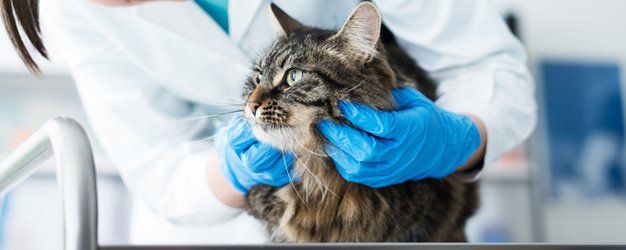This is a placeholder for the Yext Knolwedge Tags. This message will not appear on the live site, but only within the editor. The Yext Knowledge Tags are successfully installed and will be added to the website.
,
This is a placeholder for the Yext Knolwedge Tags. This message will not appear on the live site, but only within the editor. The Yext Knowledge Tags are successfully installed and will be added to the website.
Flea and Tick Control
Flea and Tick Control
Professional Veterinarian | Local, Family Owned
Over 35 Years of ExperienceWalk-In Appointments Welcome Local, Family Owned
(816) 441-3058
Protect Your Dog and Cat From Parasites
Local, family-owned Taylor Animal Hospital of Parkville offers prevention programs to keep your pets safe from parasites. These parasites are more than just a nuisance. Fleas, ticks, and roundworms can cause serious illness or even death in pets.
If you fear your pet is suffering from ailments caused by parasites, call us right away at (816) 441-3058 to schedule an appointment. Preventing parasites also help protect yourself and your family members from illnesses and disease.
Keep Ticks at Bay at All Times
Ticks are becoming more and more prevalent in North America, and they’re now being found in areas where people and pets didn’t previously encounter ticks. These parasites aren’t just a nuisance; they can cause serious and sometimes deadly diseases, including Lyme disease, Rocky Mountain spotted fever, babesiosis, and ehrlichiosisand tick paralysis.
Contact us
immediately if your pet starts:
- Coughing
- Has joint pain
- Trouble breathing
- Fever
- Weakness
- Loss of appetite
- Weight loss
- Energy loss
- Loss of coordination
We have several options for effective tick treatment and we'll work with you to find the one that works for you and your pet.
Dependable Flea Prevention
Fleas irritate your pet's skin and cause itching. Itching, in turn, can lead to skin infections. Fleas and ticks both suck blood, which can jeopardize your dog's or cat's health.
Fleas can cause problems for pets, ranging from minor to life-threatening. Not only can these parasites cause severe itching, irritation, and allergies, but they can also transmit tapeworms and diseases. Fleas can infest dogs, cats, ferrets, mice, and rats. Fleas don’t just stay on pets, they can bite people too.
Contact us
to find out how to eliminate and control fleas.
Get a Heartworm Prevention Solution
Mosquitoes can transmit heartworm infection and wreak havoc on your dog or cat, severely and sometimes fatally damaging their heart, lungs, and blood vessels. Your pet may not show any signs of infection; in those that do, symptoms can vary widely.
In dogs, signs of heartworm disease can range from coughing, fatigue, and weight loss to difficulty in breathing and a swollen abdomen (caused by fluid accumulation from heart failure). Canine heartworm infection can also lead to a life-threatening complication called “caval syndrome” (a form of liver failure). Without prompt surgical intervention, this condition usually causes death.
Cats can also get heartworms and it is more difficult to diagnose in cats than it is in dogs. Cats can suffer from a syndrome referred to as heartworm-associated respiratory disease (HARD). The symptoms can be subtle and may mimic those of asthma or allergic bronchitis. Symptoms may include:
- Signs of respiratory distress, such as rapid or difficult breathing, wheezing, and panting
- Coughing
- Vomiting
- Loss of appetite
- Loss of weight
Treatment for heartworm infection is far more expensive than prevention, and it can actually kill your dog. There is no approved treatment for cats. Some cats spontaneously rid themselves of the infection; others might not survive it. And even one or two adult heartworms in a cat can cause serious problems.
Fortunately, there’s an easy way to keep your dog or cat safe: by administering monthly heartworm preventives. Most heartworm medications also protect your pet against other parasites, such as hookworms, whipworms, ear mites, fleas, roundworms, and ticks. Trust us to recommend the best regimen of prevention for your pet.
Call Us
Fleas hiding within your pet's fur and ticks are incredibly tiny. Sometimes, infected pets won't show any symptoms at all. We can run a number of tests to tell if your pet has parasites.
(816) 441-3058
"We’ve been coming to this office for years but we met Dr. Taylor today. He is fantastic and went above and beyond as he worked with our dog. The staff continues to be terrific and accommodating to our anxious boy. I cannot give enough praise and appreciation to this practice! Truly the best!"
- Elise Alexander
VISIT US
,
This is a placeholder for the Yext Knolwedge Tags. This message will not appear on the live site, but only within the editor. The Yext Knowledge Tags are successfully installed and will be added to the website.
This is a placeholder for the Yext Knolwedge Tags. This message will not appear on the live site, but only within the editor. The Yext Knowledge Tags are successfully installed and will be added to the website.
HOURS
This is a placeholder for the Yext Knolwedge Tags. This message will not appear on the live site, but only within the editor. The Yext Knowledge Tags are successfully installed and will be added to the website.
Monday
Tuesday
Wednesday
Thursday
Friday
Saturday
Sunday
This is a placeholder for the Yext Knolwedge Tags. This message will not appear on the live site, but only within the editor. The Yext Knowledge Tags are successfully installed and will be added to the website.
HOURS
This is a placeholder for the Yext Knolwedge Tags. This message will not appear on the live site, but only within the editor. The Yext Knowledge Tags are successfully installed and will be added to the website.
Monday
Tuesday
Wednesday
Thursday
Friday
Saturday
Sunday
This is a placeholder for the Yext Knolwedge Tags. This message will not appear on the live site, but only within the editor. The Yext Knowledge Tags are successfully installed and will be added to the website.
CONTACT US
This is a placeholder for the Yext Knolwedge Tags. This message will not appear on the live site, but only within the editor. The Yext Knowledge Tags are successfully installed and will be added to the website.
This is a placeholder for the Yext Knolwedge Tags. This message will not appear on the live site, but only within the editor. The Yext Knowledge Tags are successfully installed and will be added to the website.
Hi. Do you need any help?
Privacy Policy
| Do Not Share My Information
| Conditions of Use
| Notice and Take Down Policy
| Website Accessibility Policy
© 2025
The content on this website is owned by us and our licensors. Do not copy any content (including images) without our consent.




Share On: